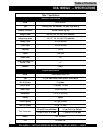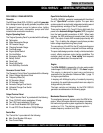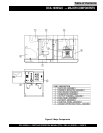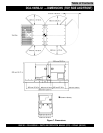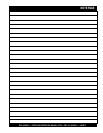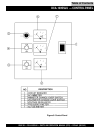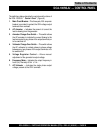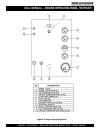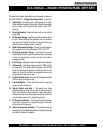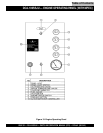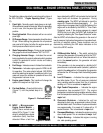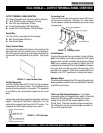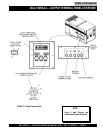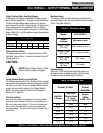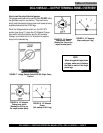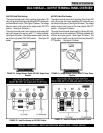
DCA-100SSJU — PARTS AND OPERATION MANUAL (STD)— REV. #2 (05/03/01) — PAGE 31
The definitions below describe the controls and functions of
the DCA-100SSJU "
Engine Operating Panel
" (Figure 9).
1. Panel light - Normally used in dark places or at night.
When activated, panel will luminate. When the generator
is not in use, turn the panel light switch to the ‘OFF’
position.
2. Panel light switch- When activated, will turn on control
panel light.
3. Oil Pressure Gauge – Normal operation should be about
25 psi. When starting the generator the oil pressure
may read a bit higher, but after the engine warms up
the oil pressure should return to normal.
DCA-100SSJU — ENGINE OPERATING PANEL (WITH KEY)
9. Pre-Heat Button – Press hold this button to start the
engine in cold conditions.
10. Starter Switch with Key – This switch has three
different positions: Stop-Turn the key to stop the engine.
Start-Turn the key to this position to start the engine.
Release the key once the engine has started and it will
automatically return to the operating position.
11. Oil Pressure Indicator - This indicator lets the operator
know the oil pressure is dangerously high or low and
will shut down the engine.
12. Water Temperature Indicator - This indicator lets the
operator know the water temperature is dangerously high
and will shut down the engine.
4. Water Temperature Gauge – During normal operation
this gauge be should read between 165
o
F to 215
o
F.
5. Charging Ammeter Gauge – Indicates the current
being supplied by the engine’s alternator which provides
current for generator’s control circuits and battery
charging system.
6. Fuel Gauge - Indicates amount of diesel fuel available.
7. Tachometer – Indicates engine speed in RPM’s for 60
Hz operation. This meter should indicate 1800 RPM’s
when the rated load is applied. In addition a built in hour
meter will record the number of operational hours that
the generator has been in use.
8. Engine Throttle Lever- This lever will change the speed
of the engine from high to low.
Table of Contents



